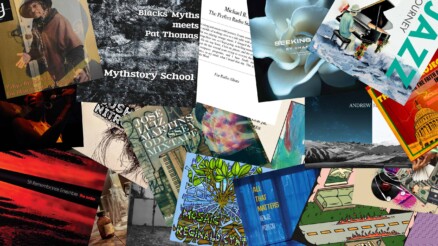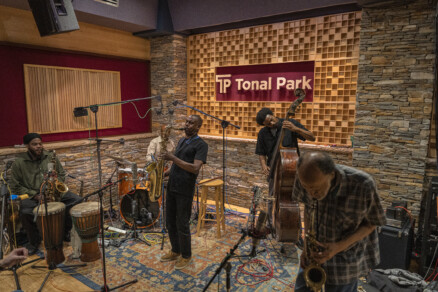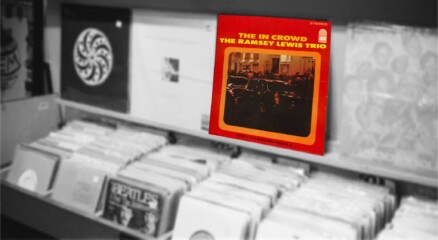Live review | Return to Forever IV: Electric fusion luminaries get a dynamic update

Chick Corea & Return to Forever IV
Merriweather Post Pavilion
Tuesday, Aug. 9, 2011
Return to Forever IV put on quite a show at Merriweather Post Pavilion on Aug. 9. There aren’t many jazz artists that can fill such a large venue, and although they didn’t hit the nearly 20,000-person capacity, the large crowd that did show up was exuberant. That energy seemed to flow to the stage and back again, as the band quickly moved into new territory. In contrast to the influential band’s last reunion tour, this new edition of Return to Forever took greater risks, often improvising collectively in addition to the more standard solos that those familiar with this band would expect.
The IV now appended to the group’s name is a version number intended to indicate something new. Rather than the classic electric-fusion quartet that came together last time, the band is now a quintet. This year, the core of keyboardist Chick Corea, bassist Stanley Clarke and drummer Lenny White is joined by Jean-Luc Ponty on violin and Frank Gambale on guitar. Their repertoire is essentially a mix of the band’s vintage electric material, though the arrangements were new. Longtime fans might ask, “Where’s Al DiMeola?” But the change in personnel provided an opportunity for a textured, nuanced reworking of the band’s arrangements. It also seemed to open the readings up to considerably more freedom and collective interplay.
I was surprised by the five-piece’s willingness to move off the charts and create on the fly, especially throughout such challenging and complex material. The content of the songs as performed each night varies greatly, as the members chart a course through these great compositions using a series of visual and musical cues. Corea and Clarke remain the co-leaders, steering the collective enterprise while the parts that formerly were strictly the guitarist’s domain are now divided between Gambale and Ponty – or doubled by the pair. This evening’s show clearly belonged to Clarke, as his performance was completely inspired, though Corea was also extremely inventive and stayed right with him.
The performance opened with Corea’s “Medieval Overture,” from 1976’s hit Romantic Warrior, and quickly led into another Corea composition, “Captain Señor Mouse,” from the 1973 Return to Forever album Hymn of the Seventh Galaxy, the group’s first fully electrified project. Corea and Clarke were both clearly in the flow by this point, trading lines and adding improvised elements to the piece. The band continued into a mini-suite that featured White’s compositions, starting as an acoustic version of “The Shadow of Lo” (from the 1974 release Where Have I Known You Before), then segueing into “Sorceress” (again off of Romantic Warrior) before returning to a high-energy section of “The Shadow of Lo.” During the first section of the medley, the band members switched over to acoustic instruments, with Clarke on double bass, Gambale on acoustic guitar and Corea on grand piano. The fresh, textured approach gave the songs more dimension, and kept the show interesting for those of us who have listened to the albums more times than we can count. Indeed, Corea divided his time roughly equally between piano and electrified keyboards, whereas in the earlier years he often would not have had a piano on the tour.
After a band introduction and remarks, they launched into the Ponty composition “Renaissance,” first released on his 1976 album Aurora, which is new to the Return to Forever repertoire but was a staple of the mid-’90s Rite of Strings trio of Ponty, Clarke and DiMeola, appearing on its lone album and becoming a centerpiece of its tours. At Return to Forever’s hands, it again received a collective treatment, though at this show the song wound up seeming like it was Clarke’s after his tremendously imaginative and incredibly executed solo. “Dayride,” Clarke’s tune from Return to Forever’s 1975 No Mystery, followed with a bit of that funk element Clarke has always brought to the band.

They then returned to the Hymn of the Seventh Galaxy project for an extended rendition of “After the Cosmic Rain,” which again featured outstanding bass work from Clarke. A suite-like edition of “The Romantic Warrior” again displayed a willingness to rework the classics in an improvised introductory segment, this time showcasing Gambale on acoustic guitar and leaving considerable space for Ponty to take flight after the main theme. Ponty and Corea were then featured in duet on an adaptation of Joaquin Rodrigo’s “Concierto de Aranjuez,” which in a nice twist continued straight into Corea’s “Spain,” one of his evergreen crowd-pleasers. It contained an audience participation sing-along that seemed to get the crowd even more involved as the show wound down. Due to time constraints, it lasted only briefly before the quintet launched into Clarke’s “School Days,” perhaps his most well know riff and another crowd pleaser, to close out the performance in an “encore” that didn’t involve leaving the stage.
The concert was well paced, with ample showcases for the band members to stretch out. The arrangements proved remarkably elastic, despite the complexity of the material. The band clearly was working together as a group, thinking on their feet, and although the big solo showcases were there, the set also conveyed the considerable durability of the songs (and the players). It did not occur to me until well afterward that two of the members are 70 or close to it, and the bassist and drummer are both over 60.
Sometimes the music can be an afterthought in reunions of legendary figures like these, but in this case it really was about the music – and not a museum version of it, either. This was living, breathing, spontaneously evolving creativity of the highest order that also kept a broad general audience engaged and enthusiastic throughout. One hopes this group will become an ongoing endeavor that will bring about new music of its own. Some fans of Gambale complained that he seemed restrained in this context, but I thought this was the best I’ve heard him play, so perhaps the requirement for economy provides a productive challenge. White’s soloing was also a model of economy, though he did work in plenty of variation in exactly how he chose to lock down the rhythm throughout the show.
The opening act, Zappa Plays Zappa, was also well received and bears mentioning. While not entirely jazz, it was a compatible enough selection that I suspect was designed to broaden the potential audience for the show (and both bands). Led by Frank Zappa’s son, Dweezil, ZPZ might best be described as a reverential handling of irreverent material. While a cover band, the group did breathe new life into the songs it selected, which seemed weighted toward the jazzier end of Zappa’s work, perhaps in recognition of the circumstances. Zappa loved controversy and directly criticized the jazz-fusion for which Return to Forever remains a standard bearer, but some elements of Zappa’s own music are not that far removed from the genre.
Al DiMeola, Chick Corea, DC, DC jazz, Dweezil Zappa, Frank Gambale, Frank Zappa, fusion, jazz, Jean-Luc Ponty, Lenny White, Merriweather Post Pavilion, Return to Forever, Stanley Clarke, Washington




